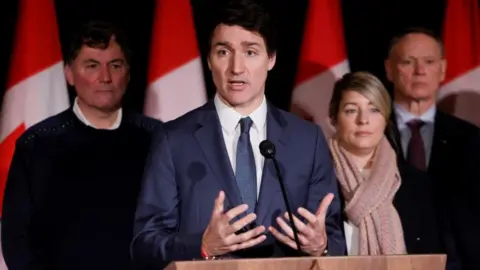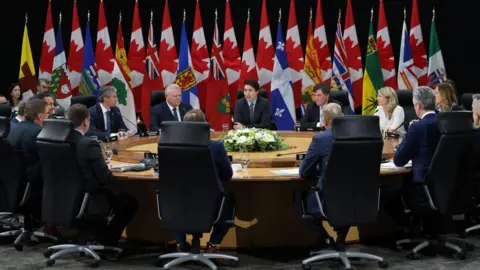Canada offers to help Trump as it scrambles to avert tariff war
 Reuters
ReutersFacing a looming tariff war with the US, Prime Minister Justin Trudeau has threatened the stick - now, he's hoping a carrot will work.
In a change of tone from his previous warnings about economic hardships, the Canadian leader is promising to help Donald Trump achieve America's "golden age," which was alluded to in the US president's inauguration speech.
"Canada is a safe, secure and reliable partner in an uncertain world," Trudeau said this week. The alternative, he said, "would be more resources from Russia, China or Venezuela".
The focus on American prosperity and national security is the latest pivot by Canadian officials as the country tries to find its footing with the new Trump administration, and - more urgently - avert the threat of blanket 25% import tariffs imposed by the US, its largest trade partner and closest ally.
Canada has been preparing a retaliatory response for weeks, and was ready for a potentially devastating trade war to be launched as soon as President Donald Trump took office.
On Monday, it looked like Canada had gotten a reprieve. In his inaugural address, Trump made no mention of Canada. But relief was short-lived. In an off-the-cuff response to a reporter's question in the Oval Office late on Monday night, Trump flipped the script by musing about placing steep levies on 1 February on both Canada and Mexico.
Now with a deadline looming, Canada must decide which tactic to take - retaliation, or appeasement.
 Getty Images
Getty ImagesIn the get-tough approach, Ottawa has eyed targeted tariffs in return on goods like Florida orange juice - to send a message directly to Trump - as well as a "dollar-for-dollar" response. It is an approach that worked during Trump's first term when he placed tariffs on Canadian steel and aluminium.
This time, however, the US president's objectives and timelines are less clear, and Canada has struggled to carve out a response. Making matters more difficult is a lack of consensus from Canadian officials on how to respond.
Trudeau, who is deeply unpopular and will soon step down, has repeatedly signalled that everything is on the table, including the "nuclear option" to tax or embargo energy exports to the US. Not all are in agreement, with Premier Danielle Smith of the oil-rich province Alberta vehemently opposing using energy as a bargaining chip.
Both Trudeau and Smith paid personal visits to Florida to appeal directly to Trump.
In remarks on Tuesday, Trudeau appeared slightly exasperated.
"We've been here before," he told reporters. "The first Trump presidency represented moments of uncertainty and threats of instability that we were able to work through constructively."
Meanwhile, Canada's ambassador in Washington DC, Kirsten Hillman, signalled that the country might be closer to understanding the position of the Trump administration.
"We have now moved from a more abstract discussion to a more concrete discussion", she said, pointing to the "America First" trade review Trump commissioned on Monday.
It lays out US trade priorities - many centred on national security - and the Trump picks who will conduct that review. They include Scott Bessent, nominated for treasury secretary, Howard Lutnick for commerce, and Jamieson Greer for US Trade Representative.
All still need to be confirmed by the US Senate.
The tariff threat has been met with deep unease by trade-dependent Canada. Roughly 75% of its exports head south. In contrast, Canada accounts for a much smaller 17% of US exports.
"The US can afford to have a long trade war with Canada, and Canada less so," Theo Argitis, managing director of the Ottawa-based public affairs firm Compass Rose Group, told the BBC.
"You have this asymmetry there that puts Canada in a very difficult negotiating position."
Trump had initially tied the tariffs to border security, saying they will be implemented until Canada and Mexico make moves to limit the flow of fentanyl and unlawful migrants into the US.
In a bid to avoid the tariffs altogether, Ottawa had promised to implement C$1.3bn ($900m; £700m) worth of new security measures along its US border.
But this appears to not be enough, with Trump doubling down on his threats, accusing Canada on Tuesday for allowing "millions" of people to come into the US unlawfully.
Trump has also criticised Canada over its defence spending and what he says is a trade deficit between the two countries.
Experts say the deficit is due to a number of factors, including the fluctuating price of energy - one of the main commodities Canada sells to the US.
There is also reported disagreement within Trump's orbit over when and how tariffs should be implemented.
At a call with reporters before the president's inauguration, Canada's energy minister Jonathan Wilkinson said there is uncertainty about Trump's ultimate objectives.
This "uncertainty and chaos" is often used by Trump as a negotiating strategy, Mr Argitis noted.
"If he scares the hell out of us, he probably thinks that we're going to be ready to concede things. He may or may not be right there," he said.
Tariffs seem to be part of a larger policy position by Trump, a self-described "Tariff Man" who has also threatened levies on Chinese, European and Russian exports.
He has said he plans to create an External Revenue Service to collect "foreign trade-related revenues", including ones generated from tariffs.
The Trump administration is also reviewing a long-standing free trade agreement between Canada, the US and Mexico ahead of its planned renegotiation in 2026. Sources have told US media that Trump wants to begin those talks sooner.
The situation - and the uncertainty around it - has left Canada with few options.
Economists have warned that Canada's GDP could take a hit of up to 5.6% if 25% blanket US tariffs are imposed on Canadian goods, depending on how, and whether, Canada retaliates.
Given this, Mr Argitis said that Canada is focused primarily on avoiding the tariffs altogether, by pitching a stronger alliance with the US on energy and national security.
Canada is also talking about diversifying trade to reduce its heavy reliance on the US as a partner, but Mr Argitis noted the country has struggled to do so in the past, primarily due to its close geographic and cultural proximity to the US.
"There's been no evidence that Canada is able to diversify at all, and so we're kind of stuck with option number one, which is to avoid a trade war at all costs," he said.
Ultimately, he added, the negotiating advantage rests with Trump.
